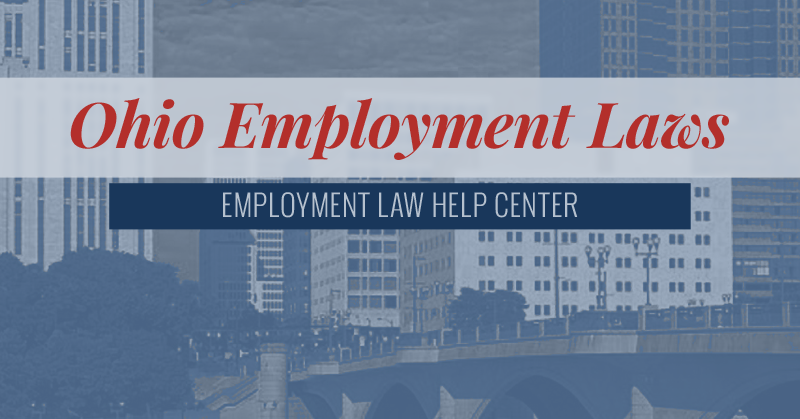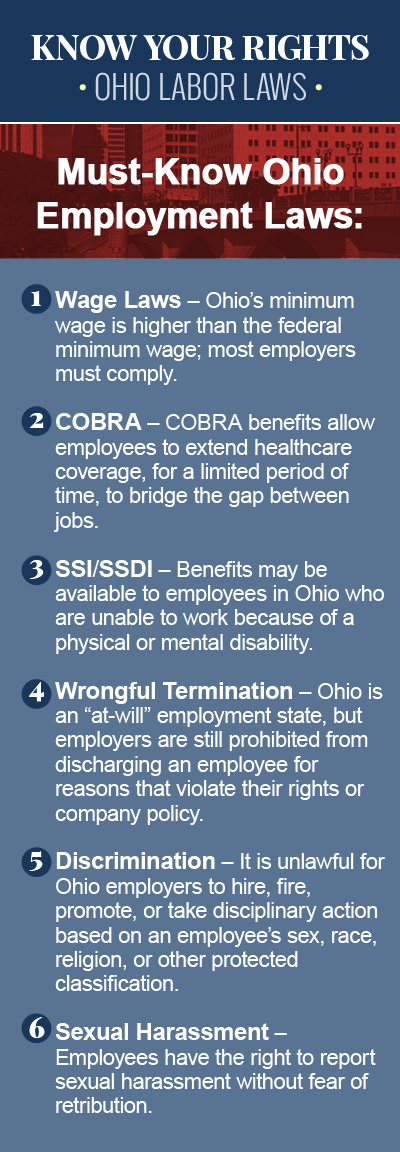Ohio Employment Law
Employment law, also referred to as labor law, is an area of the law that covers the relationship between employees and employers, and while there are federal standards for certain aspects of employment law, like minimum wage, much of this law is regulated at a state level, with standards and requirements that vary state-by-state. For example, while the federal minimum wage requirement is $7.25 per hour, Ohio has set a state minimum wage requirement of $8.10 per hour, and most employers in Ohio are required to comply with the higher wage requirement. It is imperative that employees in Ohio understand their employment rights under state and federal law, and employees who believe they have been the victim of an employment law violation may be entitled to compensation through an employment law claim.

COBRA
The Consolidated Omnibus Budget Reconciliation Act of 1985, also known as COBRA, is a law the protects Ohio employees and their families at risk of losing their employer-sponsored healthcare coverage because of events such as voluntary or involuntary job loss, death of the insured employee, divorce or legal separation from the insured employee, or reduction in hours worked. COBRA benefits allow employees to extend their coverage for a limited period of time, in order to bridge the gap between jobs.
SSI/SSDI
Supplemental Security Income (SSI) and Social Security Disability Insurance (SSDI) benefits may be available to employees in Ohio who are unable to work because of a physical or mental disability. While SSI is a needs-based program that distributes benefits to low-income adults and children of any age who are disabled or blind, eligibility for the SSDI program is based on the disabled individual’s work history and Social Security earnings record.
Wrongful Termination
While Ohio is an “at-will” employment state, which means employers in Ohio are free to hire, fire, pay and promote employees however they see fit, they are prohibited from making such decisions based on an employee’s race, gender, religion, age, or any other protected characteristic. Wrongful termination occurs when an Ohio employee is discharged from employment for an unlawful reason that violates his or her rights or company policy.

Sexual Harassment
Sexual harassment can come in the form of unwanted physical or verbal advancements in the workplace that are sexual in nature, such as sexual bribery, requests for sexual favors, sexual intimidation or unlawful touching. Harassment may also involve an employer pressuring an employee into entering a sexual relationship in return for a promotion or pay raise, a type of sexual harassment known as “quid pro quo” harassment.
Workplace Discrimination
There are numerous anti-discrimination laws in place that make it unlawful for employers in Ohio to make decisions about hiring, firing, promoting, or otherwise taking wrongful disciplinary action against employees on the basis of sex, religion, race, ethnicity, disability, or any other protected classification. Workplace discrimination also covers retaliation against employees who report instances of discrimination, workplace health and safety issues, or other violations of state or federal law.
Wage Laws
Wage and hour laws in Ohio set the basic standards for employee pay and hours worked, including such issues as minimum wage, overtime pay, lunch breaks, sick leave and vacation benefits. Like other states, Ohio has set a minimum wage requirement that is higher than the federal minimum wage requirement, and state law requires most employers to comply with the state-mandated regulations.




